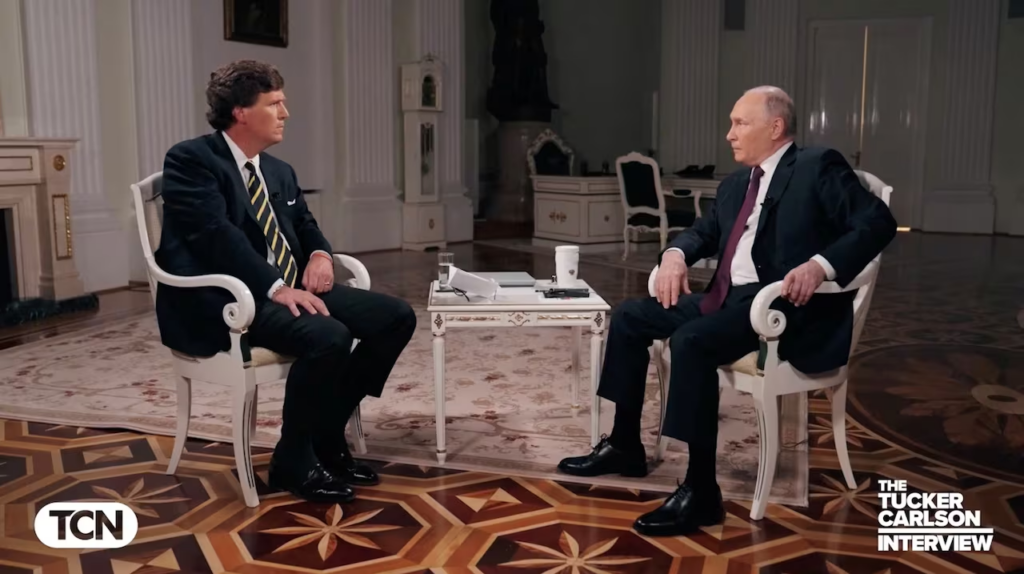|
Getting your Trinity Audio player ready...
|

- Putin’s decision to engage with Tucker Carlson demonstrates Russia’s will to challenge mainstream Western narratives and present its side of the story to a wider audience.
- Putin’s characterisation of the conflict as a “special military operation” underscores Russia’s framing of the situation, challenging mainstream Western narratives that often depict it as an invasion.
- Putin’s claims resonate with narratives of Western interference that are prevalent in Russian media and political discourse.
- The interview with Carlson provides a nuanced understanding of Russia’s motivations and grievances in the Ukraine conflict, emphasizing the need for dialogue and diplomacy in resolving the crisis.
The interview between Tucker Carlson and Russian President Vladimir Putin provides a comprehensive exploration of Putin’s perspective on the ongoing Ukraine conflict, offering valuable insights into the historical, geopolitical, and strategic considerations driving Russia’s actions in the region.
Putin’s characterisation of the conflict as a “special military operation” underscores Russia’s framing of the situation, challenging mainstream Western narratives that often depict it as an invasion. His insistence on the historical ties between Russia and Ukraine, dating back to the Kievan Rus and the shared Slavic heritage, serves to contextualize Russia’s involvement in Ukrainian affairs.
Furthermore, Putin’s criticism of Western involvement in Ukrainian politics, particularly regarding NATO expansion, reflects Russia’s broader concerns about its security and influence in the region. By highlighting broken promises from Western leaders regarding NATO’s eastward expansion and accusing the United States of meddling in Ukraine’s internal affairs, Putin seeks to justify Russia’s actions as defensive measures against perceived threats.
Putin’s assertion regarding the Nord Stream gas pipeline sabotage, attributed to the CIA, reflects Russia’s deep-seated suspicions of Western interference in its economic interests and underscores the broader geopolitical context surrounding energy security in Europe. The Nord Stream gas pipelines, crucial conduits for Russian natural gas exports to Western Europe, represent a cornerstone of Russia’s energy strategy and a significant source of revenue for the country. Any disruption to these pipelines not only threatens Russia’s economic interests but also poses a challenge to its geopolitical influence in the region.
Furthermore, the timing of the alleged sabotage coincides with heightened tensions between Russia and the West, particularly in the aftermath of the Ukraine conflict. As Western countries impose sanctions on Russia and seek to reduce their dependence on Russian energy supplies, Moscow perceives these actions as part of a broader campaign to weaken its position on the international stage. From a strategic perspective, Russia views control over energy resources and distribution networks as essential elements of its geopolitical influence in Europe.
Moreover, Putin’s claims resonate with narratives of Western interference that are prevalent in Russian media and political discourse. By framing the incident as part of a broader pattern of Western attempts to undermine Russia’s sovereignty and economic interests, Putin seeks to rally domestic support and strengthen his position as a defender of Russian interests against external threats.
Putin’s decision to engage with Tucker Carlson, known for his critical stance on US foreign policy, demonstrates Russia’s willingness to challenge mainstream Western narratives and present its side of the story to a wider audience. By addressing Western audiences directly, Putin aims to shape public opinion and influence perceptions of the conflict.
Moreover, Putin’s confidence and ease during the interview underscore his leadership style and his ability to effectively communicate Russia’s position on the world stage. His willingness to engage in dialogue, despite ongoing tensions with the West, highlights the importance of diplomatic communication channels in addressing complex geopolitical issues.
Overall, the interview provides a nuanced understanding of Russia’s motivations and grievances in the Ukraine conflict, emphasizing the need for dialogue, diplomacy, and a multi-faceted approach to resolving the crisis. By considering Putin’s perspective alongside other viewpoints, observers can gain a more comprehensive understanding of the situation and work towards peaceful resolutions.
(Aayush is a post-graduate student in International Relations at Kalinga University, Raipur. Views and opinions expressed are the author’s own)
References:
- http://en.kremlin.ru/events/president/news/73411
- https://www.forbes.com/sites/brianbushard/2024/02/08/tucker-carlson-releases-putin-interview-heres-what-he-said/
Aayush Pal is a freelance writer on contemporary geopolitical developments. The views expressed in his work are entirely his own.

Well explained article